Classical Thai Music
Back
to Articles about Thai Culture
A WAI KHRU CEREMONY IN LONDON
Propitiation of the Gods of Thai Classical Music and Initiation Rites for
Beginners
The Thai Music Club, based at the Royal Thai Embassy in London, had an ideal opportunity to mount an ancient traditional ceremony on Thursday 16 December 1999. This was the "wai khru" propitiation of the gods and grand masters of music of the bygone era, followed by the initiation rites for novice students.
While the wai khru ceremony is common place in Thailand, being carried out at least once a year at every musical house and institution which teaches traditional music, it rarely takes place in Thai communities abroad. The reason is that the ceremony must be carried out in accordance with prescribed traditions by a properly qualified ceremonial master.
On this occasion, an opportunity presented itself when Her Royal Highness Princess Maha Chakri Sirindhorn gave a full concert of Thai classical music at the School of Oriental and African Studies on 14 December 1999. The musicians in this concert included not one but two fully qualified ceremonial masters, doyens of the Grandmaster Montri Tramote. One was Silpi Tramote, eldest son and musical heir of the Grandmaster, who acted as the Master of Ceremony; the other was Sirichaicharn Fahchamroon, who performed as the Master of Music in the ceremony.
The venue was the reception hall of the Royal Thai Embassy at 30 Princes Gate, London. The participants were the members of the Thai Music Club. The Guest of Honour was Khun Ying Nantana Rayananonda, wife of the Ambassador.
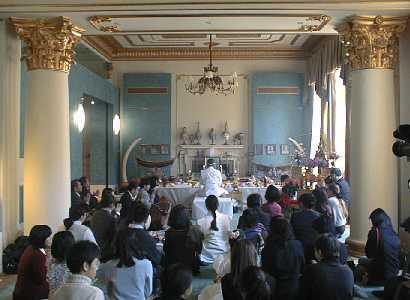
View of the hall with the mantelpiece as a make-shift altar of the gods of music. The Buddhist altar is on the right.
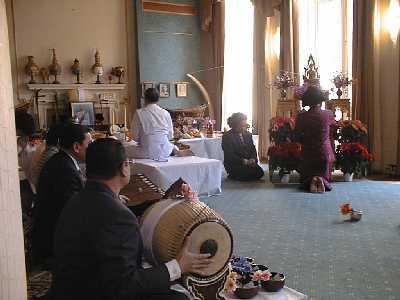
The Guest of Honour venerates the Lord Buddha at the start of the proceedings. The ceremonial ensemble performs "Sadhukar"
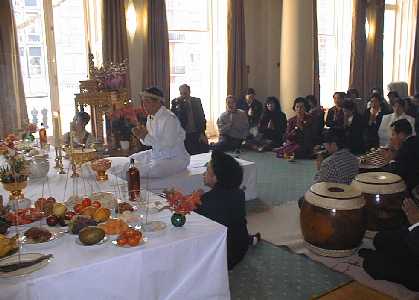
The Master of Ceremony intones cantations to invoke the potent gods of the performing arts. The assembly respectfully attends as the gods grace their presence at the ceremony.
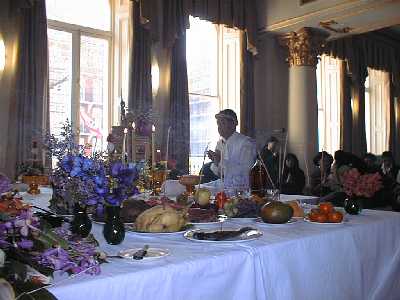
The Master of Ceremony seeks the blessing of the Gods. He invites them to partake in a feast of both cooked and raw foods, sweetmeats, fruits and drinks.
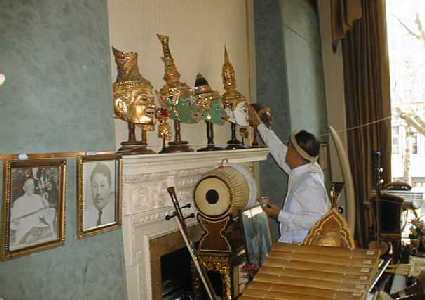
The khon mask representations of the gods are annointed. Also seen are photographs of the grandmaster musicians of the past, the "tapone" master drum also dressed in white, as well as purcussive and string instruments.
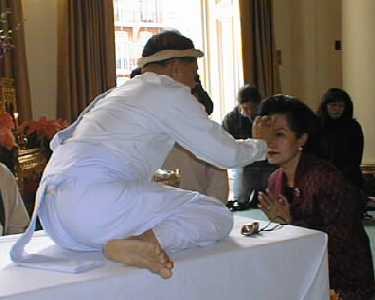
The Guest of Honour is annointed.
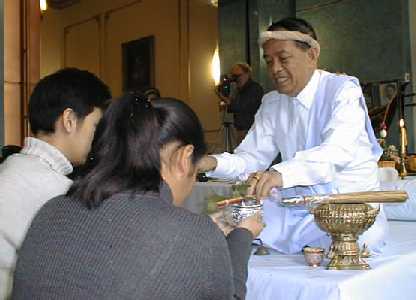
During the initiation, the Ceremonial Master first accepts a gift of water bowl, wash cloth, flowers, candle and incense sticks and a token fee. This signifies the acceptance of the person as a student.
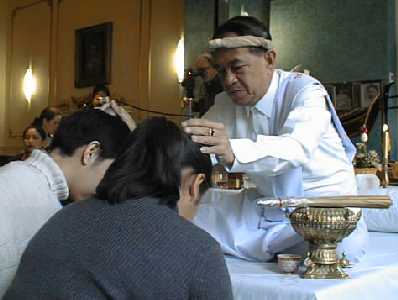
Then the candidate is initiated with the "laying of hands". For string instruments, the "ching" cymbals is used as the instrument of transmission.
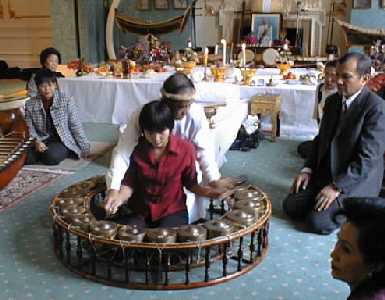
And for purcussive instrument candidates, the "khong wong yai" is the master instrument.
After such an initiation, the music student will begin to learn and to play music in earnest. Some musical houses continue to preserve ancient training practices, such as exercises at the instrument during the early hours of the morning for long durations measured by the length of time it takes to burn incense stick. Musical exercises include the training for dexterity, inner concentration and the memorising techniques.
During his training phase, a musician will graduate from one stage to the next in a number of successive initiations, measured by the pleng na phat sacred music. Few musicians reach the higher levels of proficiency, but those who do, are musicians for life.
Chakrarot
January 2000
Back to Articles about Thai Culture
Search for books about Thai Culture and Thai Classical Music
|
||||||